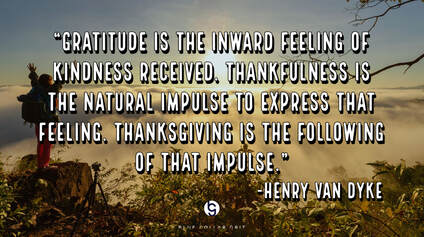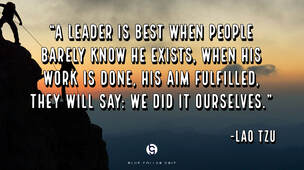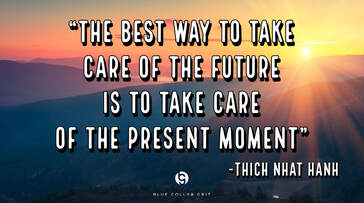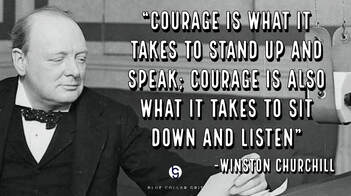Be ThankfulI have four core values that I try to live my life by. I believe living these values daily allow me to be my authentic, true self - the person I was meant to be. I found, not created, them in a time I was struggling with the gap between the person I was and the person I wanted to be. I’m grateful for the adversity that led me to that awareness.
My other values are tough, passionate, and unified. Each originated as an aspirational value, something I wasn’t yet, but wanted to be. I found them by looking at the people in my life that I admired. Afterall, just like there are reasons I don’t want to be around someone, there are also things about people that draw me to them. Many times, the values we see in others that we admire is this magnet. We have an inner desire to be with people that value the same things that we value. As I looked at the people in my life, thankfulness or gratitude quickly rose to the surface as something I wanted to embody. And, my mom was the standard bearer for thankfulness in my life. Why Should We Care? For each of my core values I created behaviors to accompany them. The behaviors allow the values to come to life, for me to live them daily. My behavior for thankfulness is to show love. As I reflected on why I connected thankfulness to my mom, one thing stood out: she always showed it. Whether it was getting up at 5:30am to fix my breakfast before school or bringing home my favorite snack from the grocery, she consistently showed me that she loved me by doing. Her selflessness and willingness to go out of her way expressed one thing over and over: I love you. Of course, she still says it at the end of a phone call or as we are leaving her house but the thoughtful actions when I wasn’t with her to let me know that she’s still thinking about me is what truly communicated her gratitude for me. In addition, my mom only has great days. Her positive attitude and outlook on life are inspiring. Of course, I know they aren’t all great but she refuses to bog your life down with complaints or a bad attitude. She’s always thankful. REAL TALK - Action Steps Thanksgiving is my favorite holiday. It’s not polluted with the need to give or receive gifts, just an opportunity to share time and appreciation for people you love. Here are a few thoughts our team had on what Thankful looks like in action.
The most important thing I’ve taken from my mom in regards to thankfulness is that we have to express it. Gratitude not expressed is like an unopened gift. We need to share it and allow it to lift others. We will never fully comprehend the potential ripple effects of one “Thank you.” For more information on building excellence in your teams, visit us at www.bluecollargrit.com. We would love to know how we could help!
1 Comment
Be Like SaltGrowing up in the country with a southern grandma living right beside us, Sunday lunches were something of an event each week. My grandma would get up early in the morning and immediately begin cooking. Fried potatoes, green beans, ham, gravy and biscuits, grits, pancakes, mush … you name it and we had it on Sunday afternoons. She cooked it all and she loved every minute of it. I’m pretty sure cooking food for her family was her love language, if that’s a thing. All of our family in the area would come to Granny’s house to eat lunch just about every week. Occasionally, the rest of the family would be busy so it would just be us - my mom, dad, and brother. That had no impact on the quantity of food she fixed.
Now, as a southern grandma, taste always trumped nutrition. Salt was always something that was used graciously. Pretty much anything tasted better with salt, a fact not neglected by Granny. The salt shaker at my mom and dad’s house is still the size of a soup can with a handle. Mom is gracious with the salt as well. I enjoy salt on most things, but over the years I have realized some things can be over salted or may even not require any salt at all. It just depends. Why Should We Care? Leadership is much the same way. The best leaders know just the right amount of salt to apply. Too much salt and you become a micromanager that doesn’t foster growth in the people you lead. Overbearing and controlling creates overbearing and controlling. Leadership requires the opportunity to fail and try again. Dowsing the situation with salt simply covers up the mistake and while we may be able to get it down, we’ve learned nothing about how to get it right the next time. That’s the problem with overbearing and controlling, you have to keep doing it - forever. Not enough salt isn’t any good either. We are left wondering ‘what could have been’. This is particularly frustrating to those pursuing excellence. They want growth and development more than anything. An absent leader fails to provide the structure and support to help move those excellence seekers forward. They will, rather quickly, move on and you will be left with people content with mediocrity. Now, just the right amount of salt is amazing. It’s perfect. It keeps us coming back for more. As leaders, when we apply just the right amount of salt our people feel safe, appreciated, and vital to our mission. They bring their best self, and work, to the team each day out of duty and love for what they’re doing. Oh, and as the leader, you are always responsible for the amount of salt added. Too much salt, it’s your fault. Not enough salt, it’s your fault. Just the right amount of salt … your team did that, you don’t even exist. REAL TALK - Action Steps Granny used salt liberally, but she always seemed to get it just right. Here’s a few ideas on helping you do the same.
The other thing about the perfect amount of salt, no one notices it. As is the case with great leadership, it operates behind the scenes and goes unnoticed as if it’s not there at all. For more information on building excellence in your teams, visit us at www.bluecollargrit.com. We would love to know how we could help! Prisoners of the MomentIt’s so easy isn’t it?
To be caught up in the whirlwind of success or the misery of failure. Both stunt progress and impede growth. It really can be debilitating from either direction. Success has a knack for convincing us that we’ve arrived, that we’re good enough. It jumps at the slightest opportunity to flatter us into becoming impressed with ourselves. Justifying that we could accomplish the same things with just a little less work, a little less struggle is the very description of complacency. Then, we wonder what happened? Where our warm and fuzzy success went. It’s still in the exact same place we left it. Failure shows us the other side of the coin. It points us to the futility of the work we’ve invested. Failure begs for excuses to soothe the ego that wants to be impressed by itself. We rationalize all the obstacles we have that others aren’t encumbered by. And, we begin to lower the standards of expectation to the point that we no longer feel the pain of failure. Good enough, begins to be our calling card. Why Should We Care? You know who is really good at not being a prisoner of the moment? Little kids and dogs. Little kids just play. No fear of embarrassment or failure and no expectation of making this crayon drawing their life’s work. They are rebels in the best sense of the word. They are unfazed with failure. Just consider the number of times a child learning to walk falls down and gets back up. At no point does he ever say, “Eh, maybe this walking thing just isn’t for me.” Kids treat success in a similar fashion. They never try to reduce their effort to the minimum necessary to accomplish the task. No way. It’s all out or nothing. Check out the kindergartner coming in from recess dripped in sweat with a hole in the knees of his pants. Less than all he had was never an option. I love dogs and much of it is for this reason. They’re never prisoners of the moment. They don’t acknowledge failure and are blind to success. Our basset hound is as detached from the approval of others as any thing on the planet. It makes me smile. And we adults think we’re the sophisticated ones … REAL TALK - Action Steps Avoiding the trap of becoming a prisoner of the moment is simple, but not easy. We’ve been trained for a long time to be victims of success and failure. A mindshift is needed badly.
We want to be present. That’s when we’re at our best. However, our ability to immediately move to the next present moment will determine our lot in life. Leaders understand that life is a series of present moments and staying in any single one limits our ability to be our best. For more information on building excellence in your teams, visit us at www.bluecollargrit.com. We would love to know how we could help! You Can Hear, But Do You Listen?Yes, it has become an ability, a skill, a talent.
Hearing is innate for most. Listening is not. Hearing is “the process, function or power of perceiving a sound.” Listening is defined as “to hear something with thoughtful attention.” Clearly our society is lacking in its ability to listen. You can even leave out the ‘thoughtful’ aspect of the definition. We rarely have any attention. Why Should We Care? As a teacher and coach, I’ve noticed a considerable decrease in people’s ability to follow simple directions. And, if the directions happen to require multiple steps or extended time between actions … forget about it. The inability to consistently listen leads one to a few additional questions: Why and what else? Why don’t we listen? Are we too busy? Do we have too many things begging for our attention - other people, social media notifications, duties and jobs? Do we just not care? All are potential answers at different times I’m sure, but I don’t subscribe to any of them in their entirety. I think our desire, willingness, and appreciation for the details is declining rapidly. Combine that with a growing focus on ourselves, rather than others and you can easily see why the inability, even unwillingness, to listen is thriving. We’re quicker than ever to judge and dismiss the thoughts, opinions, and ideas of others. Besides, why would we listen when we already know. This also points to the next question, what else? What else are we not paying attention to? What else doesn’t matter? What else do we gloss over as if it were never said? If we can’t execute one simple direction, what are the chances we can execute on multiple ones when time is of the essence and our performance depends on it. Not good I’m afraid. As a leader, our ability to listen is paramount to our impact. We can’t expect to garner trust without the genuine desire to listen and understand the people on our team. It’s not a leap to proclaim the ability to listen as the most important skill of a leader. If you work in isolation, there are a lot of skills that could trump listening’s importance. But, you don’t work alone - no one does. Therefore, the ability to listen is paramount. REAL TALK - Action Steps Improving our listening skills isn’t an easy endeavor to undertake. It requires very intentional actions mentally in order to gain the proper perspective when interacting with your team.
Listening as the most important skill of a leader … seems too simple, doesn’t it? There are a lot of things important for excellent leaders to do and the argument can be made for a vast number of other attributes. But, don’t dismiss listening casually due to its simplicity. That’s where excellence resides. For more information on building excellence in your teams, visit us at www.bluecollargrit.com. We would love to know how we could help! |
About bcI'm a teacher, coach, and parent seeking excellence while defining success on my own terms. Archives
July 2024
Categories |





 RSS Feed
RSS Feed